ASKIAM, Charlene Muhammad and Brian Muhammad
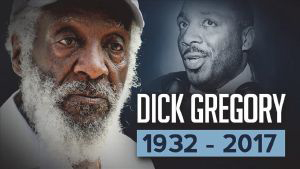
WASHINGTON–Dick Gregory–comedian, human rights activist, veteran of the Civil Rights Movement, health and diet guru, sage, and mentor–died in a Washington hospital after a short stay, surrounded by his family, just moments after he spoke by telephone with the Honorable Minister Louis Farrakhan, a longtime friend and admirer.
Mr. Gregory succumbed Aug. 19 to heart failure, his son, Christopher told the Associated Press. He was 84.
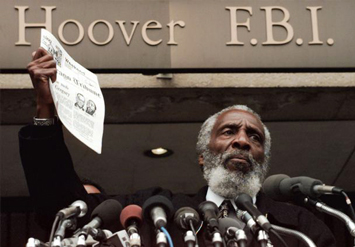
“I hate to say bad news but yesterday evening Dick Gregory passed away and I was blessed to talk to him just before he made his transition. He’s a great, great soul and any of you who know anything about Dick Gregory, you’ll know that we lost a great one but he’s gone but he’s still here. In all of us that he taught and shared his wisdom with, he’s here with us,” said Min. Farrakhan as he concluded a major message Aug. 20 at Mosque Maryam.
“It is with enormous sadness that the Gregory family confirms that their father, comedic legend and civil rights activist, Mr. Dick Gregory departed this earth tonight in Washington, D.C.,” his son, Christopher wrote on social media. “The family appreciates the outpouring of support and love and respectfully asks for their privacy as they grieve during this very difficult time.
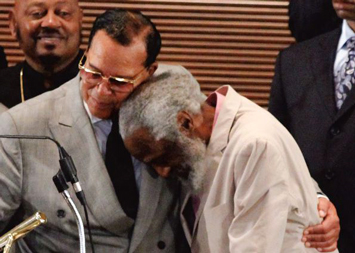
“Years of severe fasting, not for health but for social change, had damaged his vascular system long ago,” Mr. Gregory continued. “He always reminded us, many of his fasts were not about his personal health but an attempt to heal the world.”
In September 1980, Mr. Gregory engaged in just such a public fast outside the Jimmy Carter White House, during the Congressional Black Caucus Legislative Weekend activities. “I’m here at the White House … I’ve been here nine days now,” he said. Dick Gregory told this reporter why he was fasting: for a peaceful solution to the U.S.-Iran hostage crisis.
“I walked from the United Nations to here. It took me seven days, to say to the little people in the world like myself, that we have a power, that’s bigger than bombs, that’s bigger than guns, that’s bigger than the military industrial complex, called God and prayer.
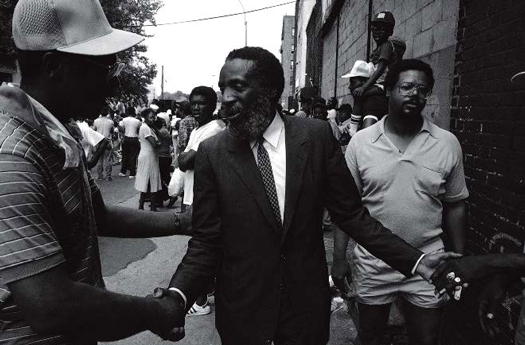
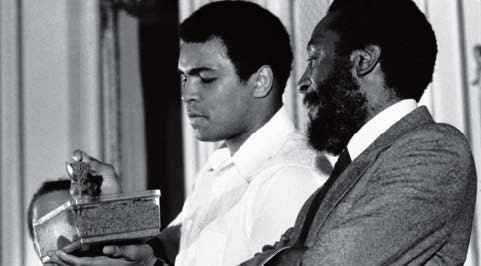
“And if we would only go to God in Prayer, we would have every major problem that we think the only way it can be solved through conflict and violence could be solved peacefully. So, I’m here to pray that the conflict between Iran and America would be solved non-violently and brought to a peaceful conclusion, and to say that the hungry people of the world should be fed.” His commitment and his faith were unshakeable.Mr. Gregory began a radical new diet course to complement his social and political course in Chicago, where he broke the glass ceiling for Black stand-up comics performing in the most exclusive clubs, when after filling in for an absent performer, he was hired for regular appearances by owner Hugh Hefner at his Playboy Club.
Then, as he can be seen on recordings of his appearances on the original “Tonight Show,” with Jack Paar, and during recordings of his night club act–Mr. Gregory was a heavy cigarette smoker and was a portly man, weighing 235 pounds on a less than 6-foot-tall frame. Soon, he would quit smoking and even stop performing in bars where customers smoked.
The strong influence of the Honorable Elijah Muhammad’s teaching “How To Eat To Live,” reached deep into all strata of life in Chicago, including to the work of dietician Dr. Alvenia Fulton who incorporated Mr. Muhammad’s guidance into her work. Under treatment by Dr. Fulton, Mr. Gregory became a vegetarian, lost 50 pounds, embarked on a path where he even founded a diet product company, and he began to engage in extreme physical activities to support his activism.
A high school track star in his hometown St. Louis, Mr. Gregory subsequently “left” Chicago on foot, literally, jogging on multiple occasions from coast-to-coast in support of his peace agenda.
He “ran” for president in 1968, winning 200,000 votes as the candidate of the Peace and Freedom Party. That year he wrote a book titled “Nigger.” He said he sent a copy of the book to Richard Nixon, “so there would be a nigger in the White House.”
After more than two decades of semi-retirement from stand-up comedy, Mr. Gregory returned to the performance circuit. Scheduled concert appearances in Atlanta and San Jose, California were cancelled when Mr. Gregory was hospitalized.
He made his last post on Twitter just days before he passed, shortly after the fatal clash between White nationalists and counter-protesters drew seemingly contradictory statements by President Donald Trump. “I’ve so much to say and can’t wait to get out of here to say it,” Mr. Gregory wrote from his hospital bed. “We have so much work still to be done, the ugly reality on the news this weekend proves just that.”
Mr. Gregory’s final book was finished and set for publication at the time of his passing. It’s set for release in September and it’s called: “Defining Moments in Black History.” “This work truly reflects my father’s rare wisdom and brilliance all wrapped up in one book,” daughter Ayanna explained on social media.
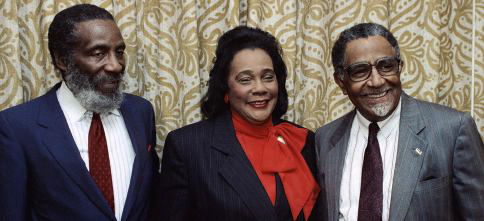
“His narrative is also a monumental testament to the beauty, the genius, and the resilience of African people,” Ms. Gregory wrote.
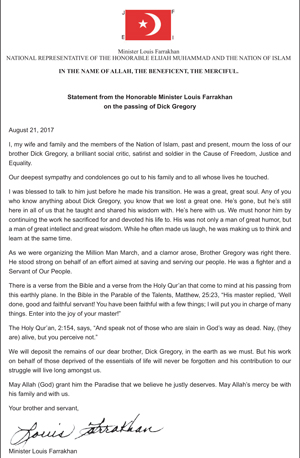
Dave Cunningham, a member of the Los Angeles City Council and new president of the Black American Political Association of California, recalled good times with his great friend.
“I think you’ve seen the Dick Gregory that we always knew,” said Mr. Cunningham.
“He was full of life when we were in high school. Every morning, he had a new joke. He was a cut up in the sense that also what has not been really portrayed is the fact that Dick was also a musician. He played the base drum in high school,” Mr. Cunningham told The Final Call.
“He always was concerned. He was an activist even growing up. He led us all out of Sumner High School one year, because Sumner was segregated. In St. Louis we were going to a segregated school, and he made no bones about it,” Mr. Cunningham stated.
He said his four-year locker mate also fought to get the city’s swimming pools opened full time to Blacks. There were some troublesome times in St. Louis and his friend was always in the middle of it, he shared.
“We went back for our 25th class reunion, and he organized a protest against them closing Homer G. Phillips, because it was the only hospital in the Black community at that time. And, he said it was extremely important, because many Black doctors … where were they going to get their residential done was to be able to go to Homer G. Phillips,” Mr. Cunningham continued.
Dick Gregory lived a full life, he said. He was a prolific savant, and many of his predictions proved true, he went on.
“Every morning, he’d say to me, ‘How’s ya mama?’ He loved to play the dozens,” said Mr. Cunningham continuing his journey down memory lane. “Every now and then we’d talk on the telephone and he’d say, ‘Dave, my line is tapped, so say hello to the FBI.’ He was tremendous. He was a good-hearted soul, too,” Mr. Cunningham said.
Many are posting and sharing what they will miss most about Dick Gregory, and for Mr. Cunningham, that would be moments shared at the Congressional Black Caucus annual gatherings.
“He always liked to carry newspapers, and always had a bundle of material that he wanted to get some opinions about,” he stated.
In his comedic genius, whether on stage or in print, the iconic historian, activist and entertainer joked about his own poverty, but he was resourceful, Mr. Cunningham concluded.
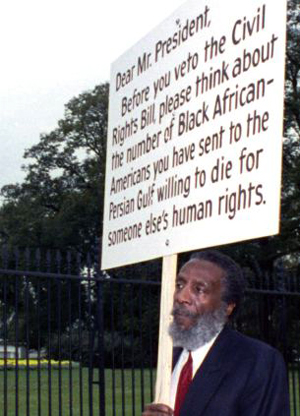
He went in-depth: “Dick could not afford the price of a pair of first-class track shoes, so at that time we would have lunch period and lunch tokens were 7 cents apiece. One day Dick came up with a great idea … He wanted to go run in the Philadelphia Inquirer Mile, that always occurred right around Thanksgiving, because he said if I could get one of those turkeys … I could really help the family.”
Every lunch, young Dick Gregory would stand in line and hustle two pennies, until he collected $14. He bought the track shoes, ran in the mile race, and got a turkey, Mr. Cunningham said.
“I’ll never forget it. He was very creative! … I’m going to miss him,” he said.
“He was probably the greatest social activist that we had for our struggle,” said Minister Abdul Akbar Muhammad, international representative for the Honorable Minister Louis Farrakhan and the Nation of Islam.
“He’s not only focused on our struggle, but international affairs that impacted us. He gave some of the deepest analysis of any social activists in our struggle,” said Min. Akbar Muhammad.
Min. Muhammad, a historian in his own right, continued, “The biggest laugh I’ve ever seen of all the pictures of the Honorable Elijah Muhammad was when Dick Gregory visited him at his home, and evidently was telling the Honorable Elijah Muhammad what we call ‘facking,’ making facts and cracking (jokes),” he said.
Min. Muhammad said there is a photo which captures the unprecedented moment. “You’ll see the Honorable Elijah Muhammad laughing in such a way that probably no one has seen a picture of him laughing that way. Dick Gregory is a man of many facts that were unseen, unnoticed or unheard by the general public.”
Dr. Julianne Malveaux, economist, author, and former president of Bennett College for Women, told The Final Call, “We are losing one of the most funniest, but also one of the most political brothers that we had.”
“Dick Gregory was always on point. He loved Black people. He was always lifting us up. He was funny as hell, and in a very, very poignant kind of way,” Dr. Malveaux said.
She said he had his conspiracy theories, but some of them actually were funny, because they delved into the realm of possibilities.
“I remember him calling me once during the O.J. (Simpson) trial … must’ve been about four in the morning. Dick Gregory calls me and says, ‘You know O.J. isn’t O.J.,’” Dr. Malveaux shared.
She said Mr. Gregory proceeded to detail how some of Mr. Simpson’s physical characteristics were altered in his view, and how he was a plant to make people focus on race relations.
“Now, O.J. was O.J., but look at how much we talked about race relations! You know, sometimes you’d hear him talk about these conspiracy theories, and you’d think, yeah. Dick Gregory is crazy. But then, it’s like crazy like a fox, because he stimulated a lot of conversation,” Dr. Malveaux said.
“Conspiracy theories and jokes notwithstanding, he was always on point,” Dr. Malveaux said. She noted that he also inspired many generations of Black comedians, really comedians period. And he broke many racial barriers back in the 60s when Blacks were kept out of many places he performed in.
Many civil rights, political, and entertainment greats, both young and old, flooded social media with tributes to the beloved husband, father, and civil and human rights champion.
“I would like to offer my sincere condolences to Dick Gregory’s wife, Lillian, his children, and the entire family. We have lost a true warrior in our long journey towards justice,” stated Rev. Dr. Joseph Lowery, co-founder with Martin Luther King Jr. of the Southern Christian Leadership Conference and former president, expressed in a press release.
“Dick was not just a comedian, author, entrepreneur and a dedicated foot soldier in the Civil Rights Movement; he was a friend and will be missed by many. His unique brand of social satire helped open the eyes of people of all races around the world,” Rev. Lowery said.
“Dick Gregory was both a personal friend and a strong supporter of the Urban League Movement,” said Mark Morial, president and CEO of the National Urban League.
“He was a frequent speaker at Urban League events and his sharp-witted insight will be sorely missed. With the nation facing a crisis of racial hostility, we would do well to be guided by his unwavering dedication to justice,” Mr. Morial continued.
“Dick was a unique phenomenon who developed a sense of mission and purpose to participate in this enormous awakening of African-Americans to deal with their plight,” said Dr. Leonard Jefferies, historian and scholar. Dr. Jefferies and Mr. Gregory’s friendship spanned 50 years. He and his wife Dr. Rosalind Jefferies worked with the iconic figure after Dr. Jeffries was selected to set up the Black Studies Department at San Jose State college in California. “Dick Gregory was built into the program,” he said. He made a commitment to be a scholar in residence coming in once or twice a month. Dr. Jefferies recalled that whenever Mr. Gregory came, the student union hall stayed filled with 1,500 students ready to interact with him, drink from his wisdom. Mr. Gregory used his gift of raising consciousness and at the same time providing a comedic approach. It was masterful watching his friend connect and keep audiences engaged incorporating humor, as he dealt with critical issues of the times.
Dr. Jeffries gave kudos to the family life of Dick Gregory as a husband and father and an example of how one can live serving the people and still guide a family into stability and service.
We can’t celebrate Dick Gregory without recognizing the role of Lillian–his wife–who played a pivotal role in how her husband served a public that crossed continents, he said.
The Gregorys were visionary as parents when they asked the Jefferies’ to take their two children on their annual cultural and educational trip to Africa, which proved to be beneficial.
Leonard F. Muhammad, longtime aide to Min. Farrakhan knew Dick Gregory since the 1960s in both roles of comedian and activist.
“He was in transition at the time from full time comedian. He started to divide his time as an activist and freedom fighter,” said Mr. Muhammad. “I saw him leave that profession to pick up his cross and follow a new path.”
He remembered personally engaging Mr. Gregory on strategies to make Black life in Chicago better. He recalled progressive moves of Mr. Gregory like his protest campaign for mayor of the Windy City and the 1968 run for president of the United States.
“His work reflects his efforts on behalf of humanity. … He demonstrated if you have the right idea and God blesses you to present it across ethnic and racial lines–it will be accepted,” Leonard Muhammad stated.
“I watched him interact with the Honorable Minister Louis Farrakhan. He supported the Million Man March and he was one who ran to the Minister, and not from the Minister during the controversy with the Jewish leadership. I love Dick and I appreciate him and I thank Allah for his life and the example he provided for us all in the definition of sacrifice for a cause greater than yourself.”












